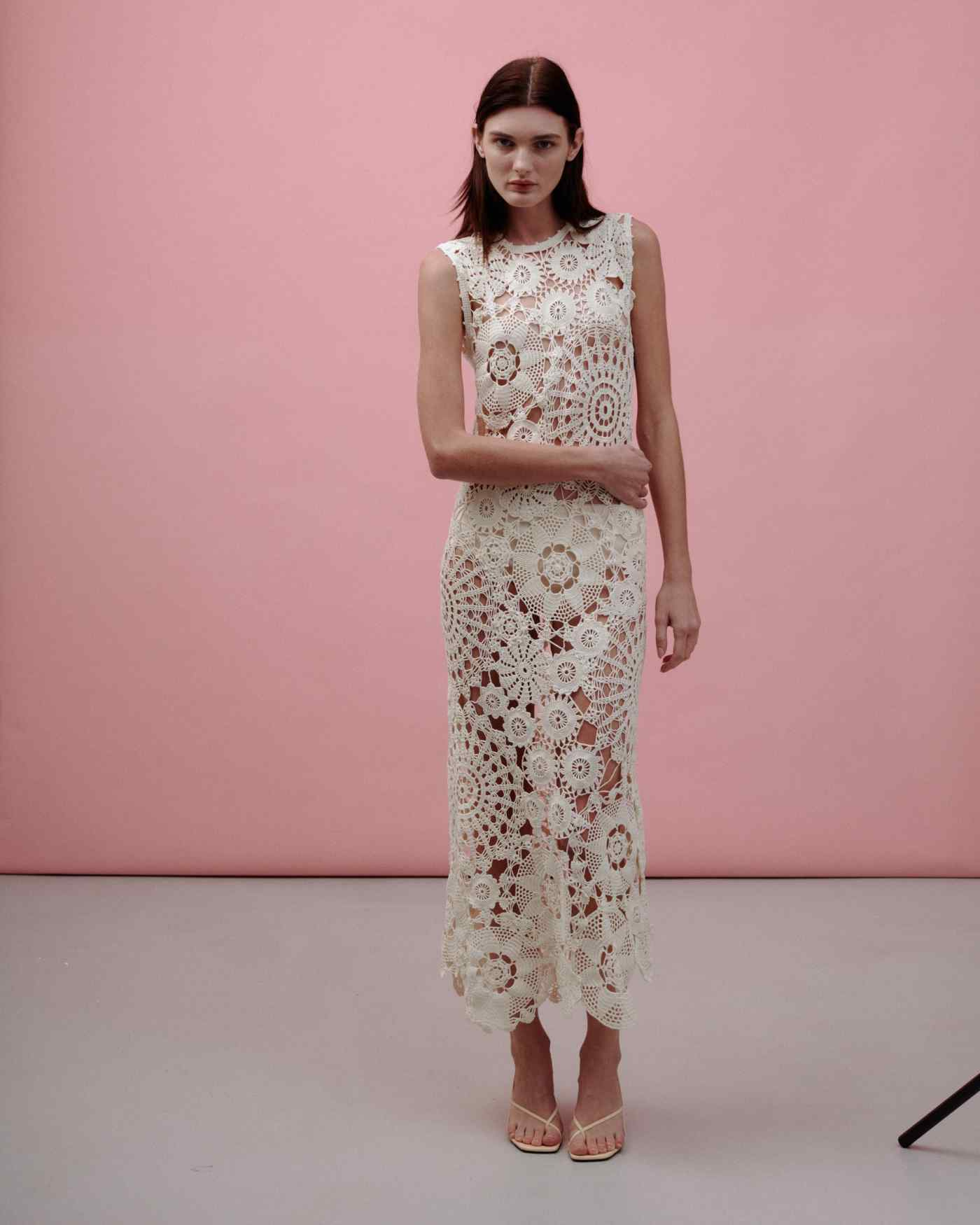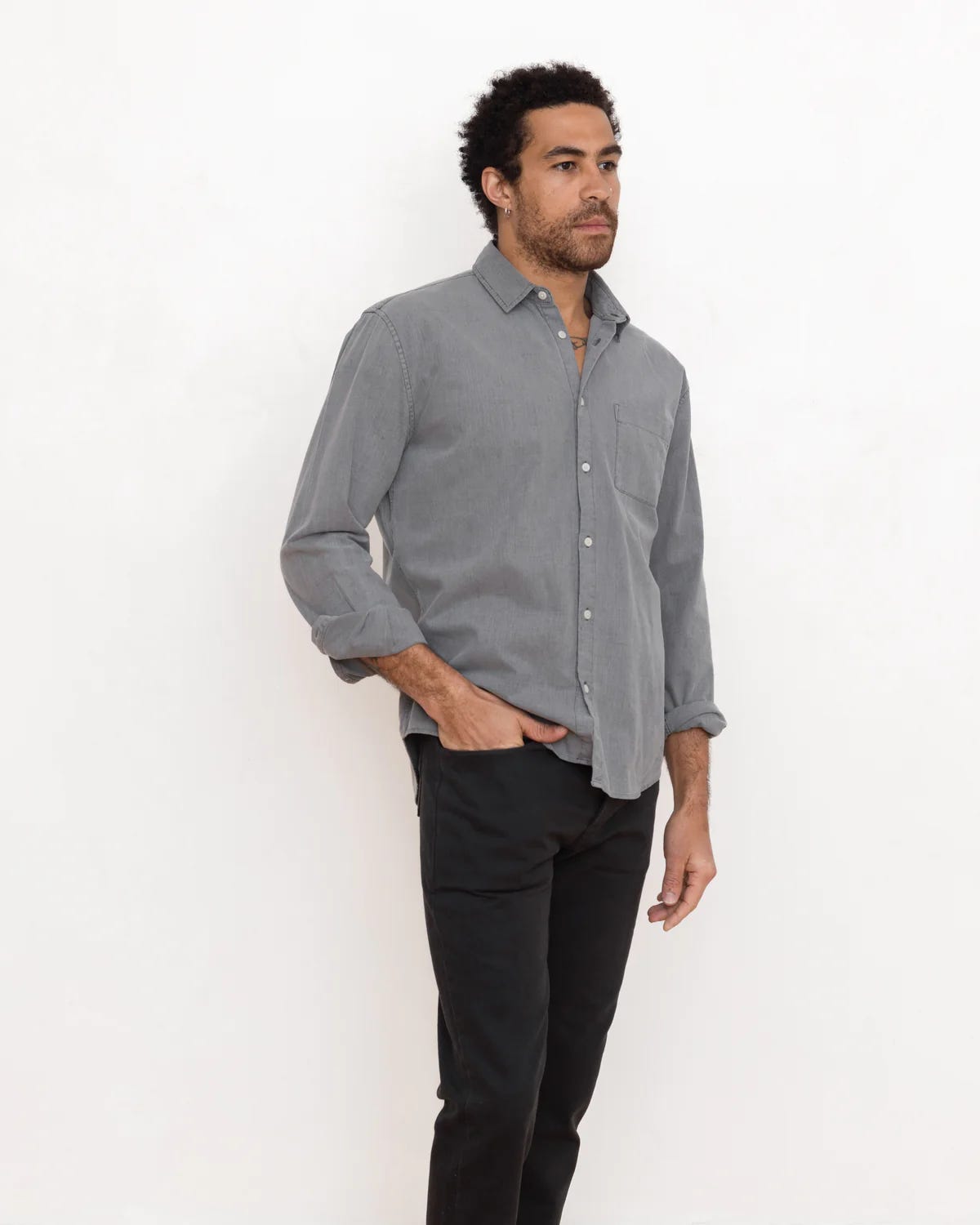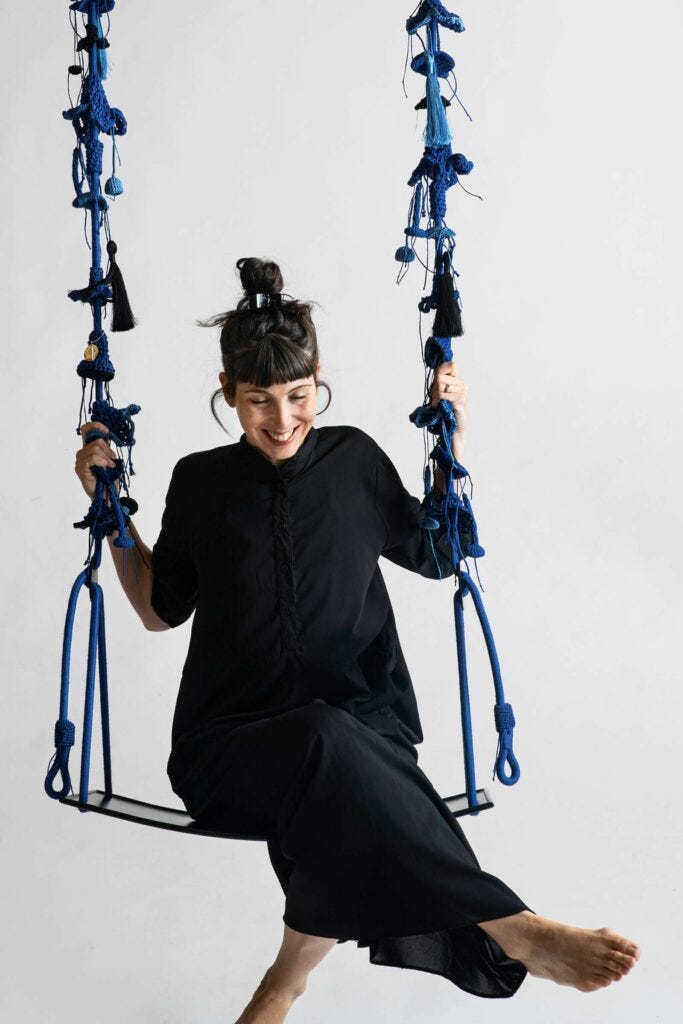The language of crochet, slow design, creepy AI stories and soulful fitness
February 24 2023
Hey there,
Despite the nice weather outside my window, I’ve felt terribly sluggish this week. Too much winter weather perhaps? Or maybe I need a break (I’m vaguely envious of all those parents on school holidays right now).
However, I am delighted with the selection of articles I’ve put together for this week’s Digest. Each topic feels like a little world into itself, so I hope that you’ll enjoy it and that perhaps the below articles will open new doors for you, creatively or otherwise.
As always, thank you for reading me, I really appreciate it, and have a good one.
Much love,
LOOKING OUT
“Artists excel at creating worlds. They do this first for themselves and then, when they share their work, for others… World-building means creating everything — not only making things inside the world but also the surrounding world itself — the language, style, rules, and architecture.”
— Laurel Schwulst in “My website is a shifting house next to a river of knowledge. What could yours be?”
EMAIL, NEWSLETTERS AND WHATSAPP
Would you give a brand or publisher your phone number to receive news? I’m not polling, but I’m curious…
Fresh from having conducted an email communication workshop with a client, I was intrigued (and I hope you will be, too) when I learned that WhatsApp is building a newsletter feature. I had lots of opinions about this, because, as our group was reflecting on the other day, some channels feel more personal than others, namely email and text messages, WhatsApp or equivalent.
That said, WhatsApp has launched communities not long ago, for larger groups, so for those out there developing these communities, the newsletter feature would probably be a godsend.
In any case, given the battle against the algorithms on IG and grandma channel Meta/Facebook, there are some exciting possibilities laying ahead for brands, creators and publishers alike. Read more here.
THE SOFT POWER OF CROCHET
You know how when you get interested in something — perhaps you want a new car, or a new pair of shoes, or whatever — and suddenly you see that thing you’re looking for everywhere?
Well, having just interviewed Tal Zur, the co-founder of Iota Project, a brilliant lifestyle start-up based in Israel that chose crochet as the technology (or rather technique) to power social change (more on that further below), I was captivated by Grace Cook’s article at the Financial Times. In it she explores the way that crochet has gained a new place in fashion’s textile vocabulary, but also how many designers, from Anna October to Chloé’s Gabriella Hearst to Farm Rio, choose to use this technique because like Tal, they are supporting the women who crochet, whether in Mexico, Greece, Turkey or Ukraine.
I was already ‘sold’ on crochet, but I feel an even stronger connection to the craft and the designers using it. Read more here.
A CREEPY AI STORY
As a teenager, I had the luck of spending at least a week’s holiday with my older half-brother and his family. Apart from being a brilliant scientist (a professor and then head of the department of Neurophysiology at Geneva University), he also had a passion for science fiction and sci-fi comic books, a type of literature that never reached either of my parents. I greatly enjoyed poring over the pages with a cup of hot chocolate after skiing every evening. We’d also watch sci-fi — Michel is the one who introduced me to “2001: A Space Odyssey” (creeped me out) and Star Wars (“The Return of the Jedi” is still one of my favorite films ever).
I never imagined that in 2023 reality would look so close to science-fiction. You know, like a crazy rich CEO looking to establish a colony on Mars, while building a social media megaphone for himself.
Well, right on the heels of that, if you’ve not heard about the recent and very creepy conversation that happened between NYT writer Kevin Roose and the new Bing-powered artificial intelligence software, from OpenAI, well, it’s worth more than a cursory glance. After all, it’s not every day that a search engine declares its love for a human! Read here.
CAN YOUR SHIRT TURN INTO SOIL?
I’ve been composting my food leftovers for a few years. On the rare occasions that I don’t eat all my fruits and vegetables in time and I have to bin them, I feel much more guilt-free knowing that they will eventually turn into compost, and back into soil. Isn’t that freeing?
Does this apply to clothes? Well it could, if your garments are made of natural fibers. But would it be safe for the environment? Thanks to an article on Forbes, I’ve just discovered that not all organic natural materials are made equal.
Contributor Esha Chhabra explored this topic with Alex Crane, the founder of the namesake brand with a strong sustainable ethos who have recently brought out a 100% biodegradable shirt. Beyond the fibers, the company has invested in mineral dyes and softeners without any harmful chemicals that will not release any toxins into the earth at the end of their lifecycle, and buttons made from the seed of the Ivory Palm tree. So indeed, you could drop that shirt into a compost and it would turn to soil within a year.
Several elements of this interview are worth noting:
The first point is that the brand is choosing this direction because they believe that asking people to consume less (something I’ve written about) is problematic: humans like to consume, acquire and collect. A reduction in consumption would require behavior change, which we all know is very difficult to achieve. This echoes the strategy of citizen fund Time for the Planet, that aims to reduce carbon footprint via financing high-impact innovation, without needing to resort to behavior change.
The second aspect is simple, and when we compare things to food, the analogy goes much further than when we stick to garments: as Alex Crane said: ‘Organic food was a niche market until it wasn’t. Same with wellness products.’ He makes a strong point.
So the only behavior that this brand is hoping for is to help move the needle and make us turn to organic, safe and biodegradable clothes. I must say, that’s a change I feel I can make.
I only hope others are inspired and jump on that bandwagon.
Read more here.
Looking In
Tal Zur on the language of crochet, trust and creating social impact through design
My latest guest on Out of the Clouds is Tal Zur, teacher at the Holon Institute of Technology and the co-founder of Iota Project, a Tel Aviv-based design and social enterprise start-up with a goal to create social impact through design. And their technology (or rather technique) powering the project is crochet.
I had the pleasure of seeing Tal and her company receive an award a few months ago, and I was moved to see her on stage with her then four-months-old baby Shira to accept the trophy.
In our conversation, Tal tells me how she came to study industrial design, curatorship and patisserie (yes, indeed, a surprising combination) then how she chose to move away from working in fashion and a serendipitous connection with her co-founder, Shula Mozes, the one tobring her the idea of crochet as the basis for their social enterprise.
From that first conversation, Tal tells me about taking up crochet herself while walking the trail of Camino de Santiago (known in English as the Way of St James), and how meditative and interesting the practice was for her. Later, things clicked into place when she visited Boston’s The Institute of Contemporary Art museum and saw a textile exhibition that sparked an idea. Shortly after, the Iota Project was born — without a business plan, without excel spreadsheets, but with great passion.
I ask Tal about the products first, because, well, theirs are quite wonderful: swings, rugs, portable cushions and blankets with straps, for indoor and outdoor living. She tells me about why they choose to make their own yarn, the benefits of designing products with a tolerance for mistakes and taking inspiration from Greek grandmothers’ doilies for their rugs and blankets.
Tal also highlights that crochet is like a design language. She compares it to music and how, by sharing crochet design drawings (not unlike sheet music), pieces can easily be made by women working remotely.
We then discuss the importance of slow design, and how Iota Project aims to create sustainable social impact by being a platform for change, and putting the opportunity in our hands, the consumers, designers, architects or other companies that will purchase the product.
We finish by talking about how Tal approaches her life as a mother (of three!) and being an entrepreneur, the importance of trust when working with women remotely, and how teaching in front of design students twice a week is a bubble that keeps her feeling creatively connected.
A very inspiring interview with a compelling and fascinating woman. Enjoy!
A FITNESS CLASS TO RECONNECT (AND PERHAPS HAVE A LITTLE CRY)
I love a fitness trend, I can’t help myself. Perhaps it’s because I want to make up for the fact I’m not an athletic outdoorsy type? I’ve been sold on Barre for the past couple of years (especially Brooklyn Barre online with Julie Granger from the Studio Paris), I swear by Pilates (thanks to Glo.com) and, of course, am a devoted yogi. Over the years, I’ve tried a bunch of fad classes, various kinds of very hot yoga, though I was never one for a bootcamp: I’m not motivated by yelling and genuinely wonder why anyone else is. During the early days of the pandemic, I enjoyed trying out the kundalini-inspired workouts of The Class.
Now I’m curious to try this new hyped class called Sanctum, which is hailed as so transformative that some of the practitioners have stopped going to therapy: a mix of chanting, aerobics and shaking, it’s meant to ‘allow people to shift to a high state of being.’ I hear that emotional strength is now part of the fitness lexicon, beyond the spa we want to find ourselves, a liberated sweaty mess on our mats. We certainly have a lot to deal with right now — everyone everywhere needs a good shake to release tension from our collectively exhausted nervous systems.
While the Sunday Times Style calls Sanctum ‘cardiothoracic soul surgery,’ my friend Fiona Leahy, quoted in the piece, called it ‘Jane Fonda on acid.’ I know what I’ll be doing on my next trip to London.
Read more about it here.











